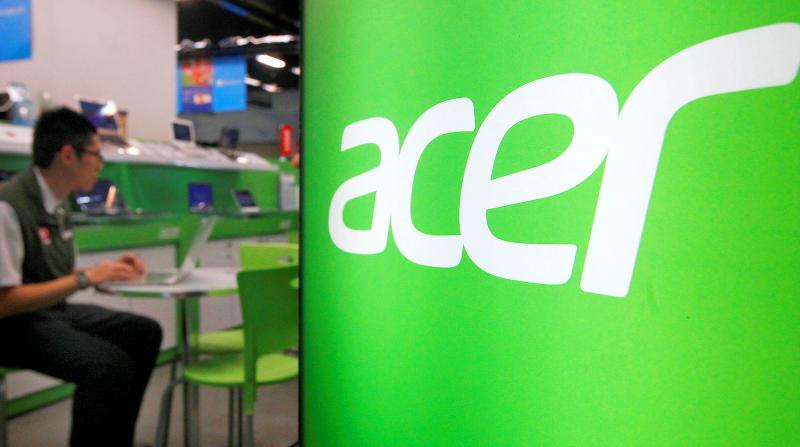PC vendor Acer Inc (宏碁) last quarter ranked first in the global Chromebook market, climbing from No. 4 in the same period of 2020, as it weathered an industry slump better than its rivals, International Data Corp’s (IDC) latest statistics showed.
Acer shipped 1.3 million Chromebooks in the quarter that ended on Dec. 31, falling 43.3 percent annually from 2.2 million units, IDC said.
That gave the company a 26.3 percent market share for the quarter.

Photo: Reuters
Dell Technologies Inc was second with 1 million units, a 63.6 percent decline from 2.7 million in the fourth quarter of 2020.
Lenovo Group Ltd (聯想) seized third place with 800,000 units, dipping 73.5 percent year-on-year from 2.9 million units.
Global Chromebook shipments plummeted 63.6 percent annually to 4.8 million units in the final quarter of last year, from 13.1 million units a year earlier, IDC said.
“Much of the initial demand for Chromebooks has been satiated in primary markets like the US and Europe, and this has led to a slowdown in overall shipments. However, Chromebook demand in emerging markets has seen continued growth in the past year,” Jitesh Ubrani, research manager at IDC’s Mobility and Consumer Device Trackers, said in a statement.
“Supply has also been unusually tight for Chromebooks, as component shortages have led vendors to prioritize Windows machines due to their higher price tags, further suppressing Chromebook shipments on a global scale,” Ubrani said.
For the whole of last year, global Chromebook shipments expanded 13.5 percent to 37 million units, from 32.6 million in 2020, IDC said.
HP Inc defended its top position by shipping 10.2 million units last year, rising 9.3 percent from 2020.
China’s Lenovo Group Inc (聯想) ranked second with shipments of 8.3 million units, growing 23.4 percent from a year earlier.
Acer ranked third with shipments of 6.4 million units, rising 4.6 percent annually.

Nvidia Corp’s demand for advanced packaging from Taiwan Semiconductor Manufacturing Co (TSMC, 台積電) remains strong though the kind of technology it needs is changing, Nvidia CEO Jensen Huang (黃仁勳) said yesterday, after he was asked whether the company was cutting orders. Nvidia’s most advanced artificial intelligence (AI) chip, Blackwell, consists of multiple chips glued together using a complex chip-on-wafer-on-substrate (CoWoS) advanced packaging technology offered by TSMC, Nvidia’s main contract chipmaker. “As we move into Blackwell, we will use largely CoWoS-L. Of course, we’re still manufacturing Hopper, and Hopper will use CowoS-S. We will also transition the CoWoS-S capacity to CoWos-L,” Huang said

Nvidia Corp CEO Jensen Huang (黃仁勳) is expected to miss the inauguration of US president-elect Donald Trump on Monday, bucking a trend among high-profile US technology leaders. Huang is visiting East Asia this week, as he typically does around the time of the Lunar New Year, a person familiar with the situation said. He has never previously attended a US presidential inauguration, said the person, who asked not to be identified, because the plans have not been announced. That makes Nvidia an exception among the most valuable technology companies, most of which are sending cofounders or CEOs to the event. That includes

INDUSTRY LEADER: TSMC aims to continue outperforming the industry’s growth and makes 2025 another strong growth year, chairman and CEO C.C. Wei says Taiwan Semiconductor Manufacturing Co (TSMC, 台積電), a major chip supplier to Nvidia Corp and Apple Inc, yesterday said it aims to grow revenue by about 25 percent this year, driven by robust demand for artificial intelligence (AI) chips. That means TSMC would continue to outpace the foundry industry’s 10 percent annual growth this year based on the chipmaker’s estimate. The chipmaker expects revenue from AI-related chips to double this year, extending a three-fold increase last year. The growth would quicken over the next five years at a compound annual growth rate of 45 percent, fueled by strong demand for the high-performance computing

TARIFF TRADE-OFF: Machinery exports to China dropped after Beijing ended its tariff reductions in June, while potential new tariffs fueled ‘front-loaded’ orders to the US The nation’s machinery exports to the US amounted to US$7.19 billion last year, surpassing the US$6.86 billion to China to become the largest export destination for the local machinery industry, the Taiwan Association of Machinery Industry (TAMI, 台灣機械公會) said in a report on Jan. 10. It came as some manufacturers brought forward or “front-loaded” US-bound shipments as required by customers ahead of potential tariffs imposed by the new US administration, the association said. During his campaign, US president-elect Donald Trump threatened tariffs of as high as 60 percent on Chinese goods and 10 percent to 20 percent on imports from other countries.